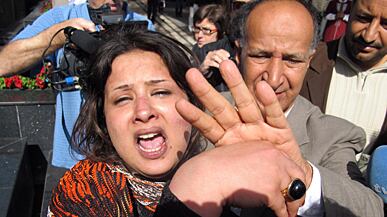Eman al-Obeidi , the Libyan woman whose harrowing story of rape at the hands of Gaddafi troops has gripped the world, said Monday that she still fears for her life, even after being released. In a telephone interview with Anderson Cooper, al-Obeidi said, “They have threatened me with death and told me I will never leave prison again if I go to the journalists or tell them anything that is happening in Tripoli.” Al-Obeidi said she was abducted three times by Col. Muammar Gaddafi’s forces, and was sodomized with rifles and beaten until a fellow female prisoner helped her escape. She then burst into a hotel full of foreign journalists on March 26 and told her story. After being taken into police custody, she was questioned for 72 hours, where interrogators poured water on her face and threw food at her before a doctor confirmed she had be
For Eman al-Obeidi, the horrors just keep getting worse. Now the men she says raped her are suing her. In Libya, as across much of the Middle East, rape victims are doubly traumatized. After their assaults, they are shamed—even murdered—for destroying the family’s honor.
“Women still suffer from outdated cruel concepts that a woman who was raped brought it on herself,” Sarah Leah Whitson, a Libya researcher for Human Rights Watch, says. “She may as well go hang herself because who is going to marry her now.”

Because rape victims are at risk of being killed by either their families or that of their attackers, Libya sends victims into social rehabilitation centers. Women, even children, who have been raped, are sent away for “moral” re-education. The only way out of such centers is to marry your attacker. This is a solution some Libyan judges mandate. In a 2005 report, Human Rights Watch documented a girl in one such social rehabilitation center who had tried to defend herself against rape by wielding a kitchen knife. She was charged with assault.
Before the Gaddafi family revealed its bloody hand to the world by exterminating its own people, two of Gaddafi’s children, his banker son, Saif-al Islam, and his lawyer daughter, Aisha, ran the only human rights organizations allowed to function inside of Libya.
In the past, Aisha, who served on Saddam Hussein’s defense team, has paid lip service to looking into these social rehabilitation centers. Clearly, now that she has appeared at rallies supporting her father’s bloody campaign, any kind of credibility she had on human rights issues have been obliterated. It remains to be seen if she has opened herself up to charges of waging crimes against humanity, as many of her brothers have done with their actions over the past several weeks.
Two doctors have reported that they’ve found condoms and Viagra in the pockets of Gaddafi’s dead soldiers, which they believe indicates a premeditated intent to rape.
Libya has no constitution, and the death penalty applies to anyone caught advocating for a constitution. With no fair laws on the books, women are left to suffer from social codes that are often lethal. Being killed for family honor is not a practice unique to Libya. Throughout the Middle East, in a practice that dates back to at least 1700 B.C. in Hammurabi’s code—not the Koran—women are held to be the carriers of family honor. Violation of honor, even rape, can legally result in death.
From Tunisia to Egypt to Bahrain to Libya, it’s possible that the political revolutions currently sweeping the Middle East and North Africa may have profound social impacts too. Already, social networking is helping to reform outmoded concepts of honor and shame in nearby Egypt. Through SMS, Egyptian women can report via text when they are being harassed.
In the midst of its revolution, however, Libya has no such tools. Technology, Facebook, Twitter, haven’t caught on in Libya due to the regime’s brutal repression and attempts to seal Libya off from the rest of the world.
Now, in the midst of civil war, Libyan women are worse off than ever. As is usually the case, women and girls suffer more during war than anyone else. From Congo to Sudan to the Balkans rape has become a tool of power and war. Both men and women suffer from such abuses. But for women, who may bear the enemies' children after violation, rape can be a form of genocide: a means of ethnically wiping out the future of a people by “tainting” their children.
In the chaos of Libya today, two doctors working in the eastern city of Ajdabiya have reported that they’ve found condoms and Viagra in the pockets of Gaddafi’s dead soldiers, which they believe indicates a premeditated intent to rape. One physician, Abdul Rahim Aquila Najib, told Al Jazeera, “The Gaddafi soldiers have said that those of your women who celebrate loudly, we will come and we will rape them.”
It’s too early to know for sure if rape is being used as a crime of war in Libya, but anecdotes ranging from Eman Al-Obeidi’s to that of two male doctors hundreds of miles away indicate that such a crime may already be under way. Here is one more legacy the Gaddafi regime may leave behind—another possible line item against The Leader and possibly his children—in the mounting list of war crimes.
Eliza Griswold, a senior fellow at the New America Foundation, is the author of the New York Times bestseller The Tenth Parallel.






